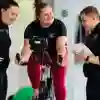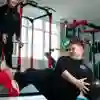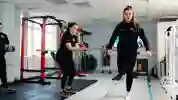


Gain the clinical skills to prevent, diagnose and treat musculoskeletal conditions with this hands-on degree.
Designed for students wishing to specialise in a role related to sport and fitness, this fully-accredited course combines theory, hands-on experience, critical reflection and professional judgement, as well as the latest techniques in exercise rehabilitation.
You’ll learn in modern, fully equipped facilities and have access to CV-boosting opportunities to kickstart your career before you graduate. This includes being part of the University's Health, Injury and Performance (HIP) Hub following recent investment, as well as utilising our newly-built strength and conditioning suite.
About this course
Sport Rehabilitators work with patients or athletes with a wide range of neuro-musculoskeletal conditions, whether it’s managing or treating a long-term medical issue or overseeing their recovery from a shorter term injury.
You’ll therefore need to have the confidence to act with independent autonomy towards your patient’s care when necessary, as well as the ability to work with other healthcare professionals, so a thorough grounding in the likes of physiology, psychology, biomechanics, and strength and conditioning is essential.
You’ll also spend a minimum of 400 hours on clinical placement gaining real-world experience, with our partners including professional sports clubs such as Hull FC and Hull KR, as well as private practitioners.
You could even develop your experience at the University's Health, Injury and Performance (HIP) Hub. This student-led clinic offers appointments to real patients from the local community and gives you the opportunity to put your knowledge into practice by overseeing their assessment, diagnosis, treatment and rehabilitation as part of your degree.
You’ll have the chance to showcase your final-year project at our Student Thesis Conference, celebrating your research alongside fellow students and professionals. It’s a fantastic way to develop presentation skills, make even more industry connections, and share your passion for sport and exercise science - learn more here.
This degree is accredited by the British Association of Sport Rehabilitators and Trainers (BASRaT). This means you can apply to BASRaT to become a graduate member at the end of your degree.
Study speed, stamina and agility at your own pace
Module options
Each year, you’ll study modules worth a certain number of credits, and you need 120 credits per year. Most modules are 20 credits – so you’ll study six modules each year. Some longer modules, such as a dissertation, are worth more. In these cases, you’ll study fewer modules - but the number of credits will always add up to 120. Some modules are compulsory, some are optional, so you can build a course that’s right for you. To graduate, you will be required to complete Emergency First Aid and Level 2 RFU Pre-Hospital Immediate Care in Sport.
Filters
Human Anatomy
This module introduces you to the human anatomy in detail. You’ll explore topics including: the structure of the human skeleton, major landmarks, and joints and classification.
core
20 credits
Human Physiology and Nutrition
Examine the key body systems including the circulatory, respiratory, nervous and gastrointestinal – in relation to metabolism, energy production and macronutrient function.
core
20 credits
Introduction to Musculoskeletal Injuries and Assessment
This module provides a comprehensive overview of the skills and techniques required for effective clinical assessment of the musculoskeletal system. As well as introduce the concepts of clinical reasoning, the experience of pain and common assessment approaches as they relate to the Graduate Sport Rehabilitator’s (GSR’s) practice.
core
20 credits
Conducting Science in Sport, Exercise and Rehabilitation
A solid grounding in to the scientific practice underlying the subject. It explores and critiques how data is collected and analysed.
core
20 credits
Therapeutic Interventions
Gain an understanding of the rationale behind therapeutic modalities, including current knowledge of the healing process at the cellular level and analgesia.
core
20 credits
Introduction to Exercise and Training
Through a mix of both theoretical and practical sessions, you'll develop your knowledge and experience of a number of different exercise and training modalities that a strength and conditioning coach could utilise in an effort to affect and improve performance. This module will also help you to develop as a coach, explaining the principles of good coaching, communication and delivery to a diverse range of athletes and non-athletes alike.
core
20 credits
Clinical Skills
The module will allow students to demonstrate competency in skills, such as special testing & peripheral and spinal joint mobilisation.
core
20 credits
Professional Practice
Get to grips with the professional standards set by the British Association of Sport Rehabilitators and Trainers (BASRaT) and how these interact with working practices.
core
20 credits
Research Methods
Prepare and complete a small action research project to develop skills that will help you across your studies. It's hands-on learning about research methodology, ethical approval, data analysis and formulating research questions.
core
20 credits
Our facilities

Watchlist
Degrees that live up to life
Course montage
1 min
Dr Ben Oliver
Course overview
2 mins
Andy Ayre
Student Story
2 mins
Facilities
Course Highlight
3 mins
Strength and Conditioning Course Overview
Course overview
2 mins
Featured academics
You’ll be taught by experts who know your name: tutors who work at elite, semi-elite and amateur levels of sport and in private practice.
Our highly-qualified staff also deliver trauma courses for the Rugby Football Union nationally.

Lois Smith
Director of Studies
Lois is our Director of Studies in Sport, Exercise and Rehabilitation Science. After initially joining the University in 2017, she completed her Masters the following year and has gone on to become a Senior Fellow of the Higher Education Academy.

Dr Ben Oliver
Lecturer
Ben is our programme director who joined the Sport Rehabilitation lecturing team in 2020. Alongside working in rugby union and directing two private sports injury clinics, he is the module leader for Clinical Skills.
Entry Requirements
What do I need?
This course is currently available through Clearing, which means our entry requirements are a bit different to what they would normally be.
At Hull, you're a name not a number. During Clearing, we look at all of your qualifications and experience, not just your academic grades. We may be able to offer you a place whatever your situation. Get started by completing our eligibility checker, and find out immediately if you could study at the University of Hull.
Have questions? Our admissions team will be happy to help.
Fees & Funding
How much is it?

Future prospects
You’ll graduate with clinical skills in the prevention, assessment and management of neuro-musculoskeletal injuries.
Our students go on to work with sports clubs at all levels, in the military, in private practice and with the NHS. Others find their professional skills are sought by employers across the graduate job market.
Our careers team will be on-hand to give you expert advice and training, and you’ll have the chance to network with a wide range of employers throughout your degree as part of our annual Student Thesis Conference.
Check out our video to discover how Sport, Exercise, and Rehabilitation Careers provide students with the chance to turn their passion for physical activity into a fulfilling career, empowering them to enhance lives through fitness, recovery, and overall well-being.
Become part of the next generation of futuremakers
Like what you've seen? Then it's time to apply.
The standard way is to apply through UCAS. This will give you the chance to showcase your skills qualities and passion for the subject, as well as providing us with your academic qualifications.
Not ready to apply yet?
Visit our next Open Day, and see all that the University of Hull has to offer. Talk to our lecturers about your subject, find out what university is really like from our current students, and take a tour of our beautiful campus and amazing facilities.
You may also be interested in...
94% employability (Sport, Exercise and Rehabilitation Sciences) UK domicile full-time first degree leavers; Higher Education Graduate Outcomes statistics, for the academic year 2022/23, published by the Higher Education Statistics Agency June 2025.
Health Sciences: Ranked 9th in the UK for learning resources. National Student Survey (NSS) 2025, HEIs only.
Subjects allied to medicine: Ranked 10th in the UK for Teaching Quality. The Times and Sunday Times Good University Guide 2026.
All modules presented on this course page are subject to availability and this list may change at any time.